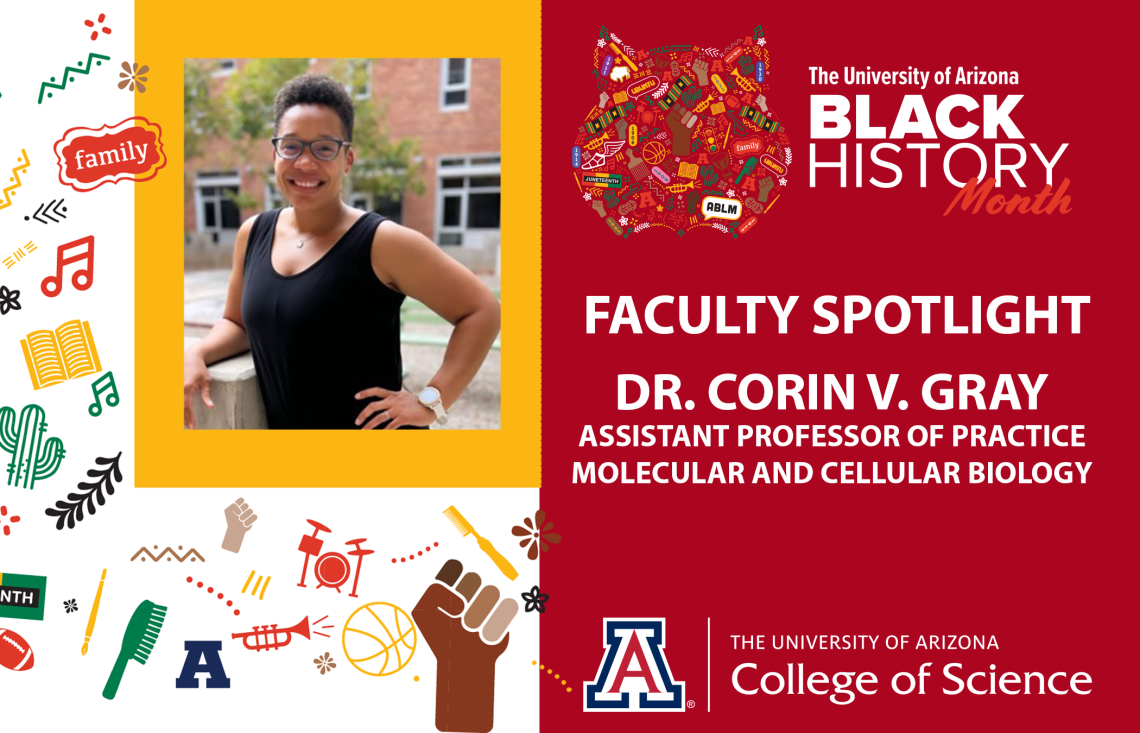Black History Month Faculty Spotlight: Dr. Corin V. Gray

The College of Science is celebrating Black History Month by featuring some of the College’s outstanding faculty and students. Our first featured faculty member is Dr. Corin V. Gray, an Assistant Professor of Practice in the Department of Molecular and Cellular Biology.
The College of Science spoke with Dr. Gray to learn more about their journey to the University of Arizona, being a first-generation college student, and why she loves being a scientist.
Dr. Corin V. Gray
Assistant Professor of Practice
Molecular and Cellular Biology
College of Science: Tell us a little about yourself, your background, and your journey to the University of Arizona.
Gray: My full name is Corin Vashoun Gray formerly known as Corin Vashoun White. I identify as a female African-American wife, mother, Christian, scholar, and scientist. I am proudly first-generation and I received my bachelor’s in biology from Spelman College in 2010 and a doctorate studying ecological genomics from Kansas State University, in 2015. In my previous position (Research Associate) at California State University, Monterey Bay (CSUMB), I taught professional development courses to serve undergraduates in Undergraduate Research Opportunities Center (UROC) programs. I also worked with faculty to implement course-based undergraduate research experiences (CUREs) by co-facilitating a Faculty Fellows Program. My mission is to make changes in the way educators teach biology in order to make science more accessible and approachable for all students. I chose to continue my journey at the University of Arizona in order to realize said position; applying the lessons from administration to my role as an Assistant Professor of Practice.
COS: When looking back on your childhood and spending time with family, are there any favorite traditions or memories that stick out to you?
Gray: I remember when I first decided to be a researcher. As a first-generation college student, this term was and is still very vague to both my intermediate and extended family members. However, I have about a decade of fond memories with my extended family during Christmas and, during this time, while I was in graduate school, I used to discuss potential project ideas with various family members. In this way, they learned a bit about molecular biology and my ideation benefited from various perspectives.
COS: Who are some of the people who have made the greatest impact on your life?
Gray: Aditi Pai, Mark Lee, Michael Herman and Kimberly Tanner.
This list is composed of my undergraduate, graduate and postdoctoral mentors. Dr. Pai was my undergraduate research mentor, Dr. Lee was the hardest Professor I've ever had who challenged my ways of thinking and knowing as an undergraduate. Dr. Herman was my PhD mentor and advisor. Dr. Tanner was my teaching mentor during my postdoc.
Mentors have great responsibility and the grand opportunity for positive influence and lasting impact. All of my mentors have influenced my teaching and mentorship philosophies; specifically, the emphasis on student perspective, connection to student personal/professional interests and/or the intentional positioning of people and resources.
COS: What was it that drew you to your area of research and expertise?
Gray: My draw to research in general is the ability to say “I found”. I enjoy investigating biological phenomena and challenges associated with providing an equitable science education to all students. In science, I enjoy both basic and applied research and it has been a privilege to publish my work in journals such as frontiers in Cellular and Infection Microbiology, mBio, and the American Journal of Respiratory and Critical Care Medicine. I am new to science education research and my wonderings are centered around equity and inclusion as science is a historically exclusive space.
COS: What is your favorite part of being a scientist?
Gray: I like that as a researcher and scientist I am always learning either from my own research or the research of my colleagues. Science, even how to engage in scientific inquiry, is always evolving and there is always something new to be discovered.

